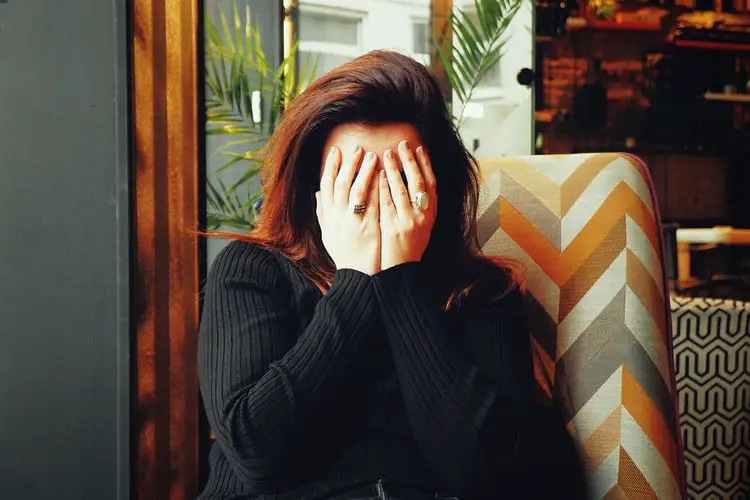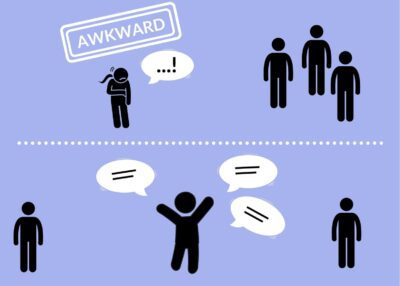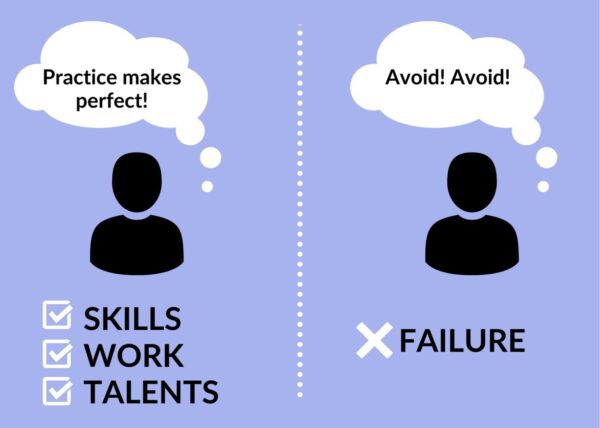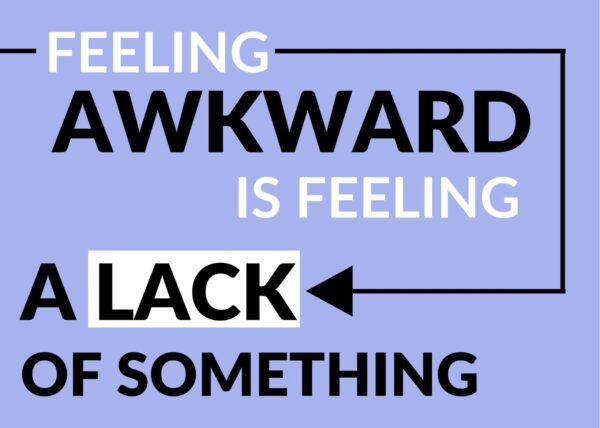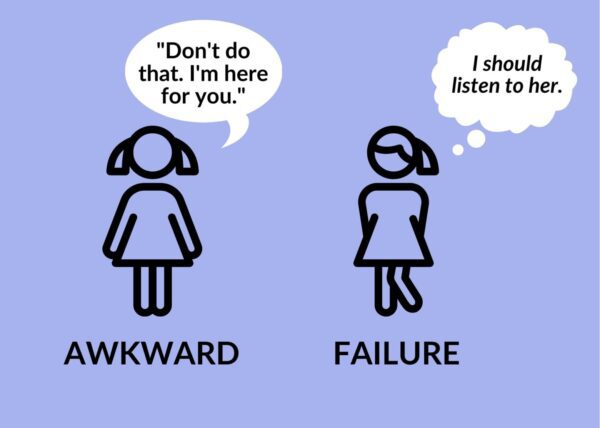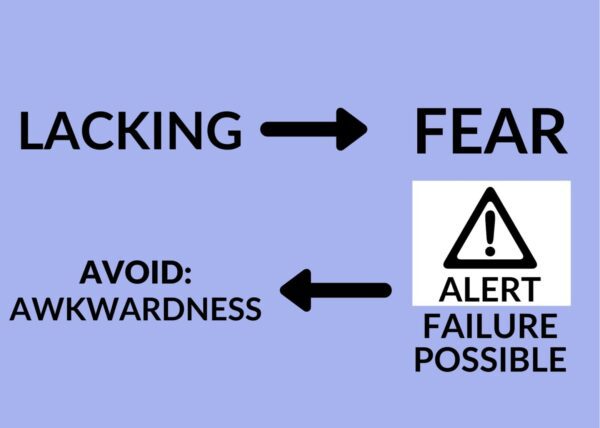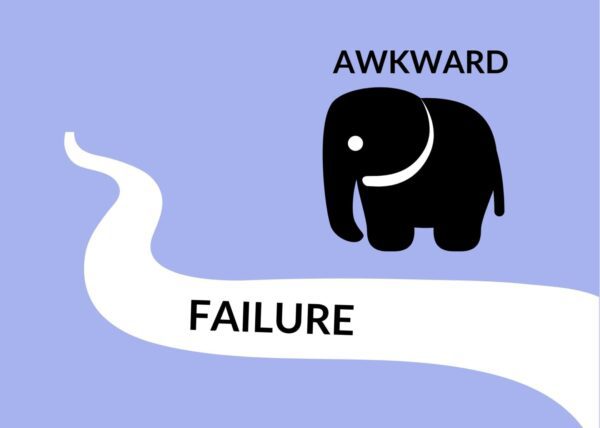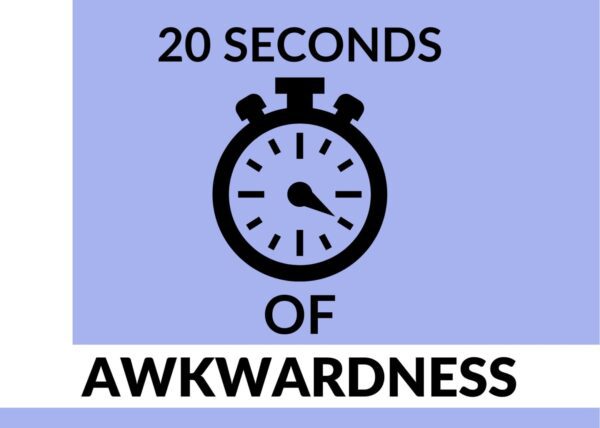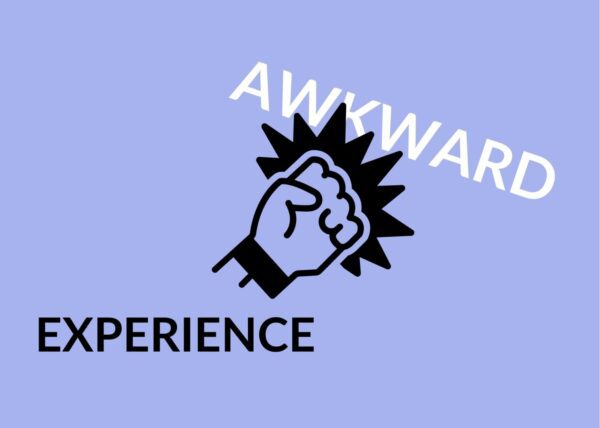Learn why feeling awkward can be your new superpower. Read the post below or check out the video version of my post below.
Why Feeling Awkward Might Be Your Superpower: 20 Seconds of Awkward
I was painfully shy when I was young. Being around strangers terrified me, god forbid speaking to them. Surely I would die in feeling awkward somewhere between the words escaping my mouth and their replies. I avoided public places and hid behind objects, desperate to miss these death-inducing interactions.
My parents, crazy socialites that they are, recognized the dangers of my debilitating shyness. So they did what any cruel, torture-loving parents would do: they forced me to talk. Again and again. In the grocery store, at my basketball practice, around their work barbecues. Even though I was feeling awkward.
And you know what?
I didn’t die. Nor did the imposed persecution send me on an immediate trajectory toward therapy. (Don’t worry, I would still end up there for other reasons.)
Instead, with each new interaction, my fear of imminent death began to dissolve alongside my muteness. It seemed that talking to new people wasn’t as scary or awkward as I once thought. By high school, other parents commended my folks for how outgoing and welcoming I was toward their shy daughters. (Much to my stubborn, credit-withholding teenage dismay.)
And by college? By golly, I jumped to perform fun bets that had me sitting down at a table with 25 unnamed sorority girls, running my hand through an unknown boy’s hair*, and otherwise making a public spectacle of myself in front of strangers.
What caused my transformation from a painfully-shy little caterpillar into a conversation-loving, stranger-seeking butterfly? Was there one moment or relationship that served as my new “outgoing elixir” to overcome feeling awkward?
You shouldn’t be surprised by my definitive “no.” Even though our society makes us think quick-fixes can save us, and our instant-gratifying brains latch onto this notion with glee, we all know deep down that nothing good happens in an instant.
*Disclaimer: I don’t encourage you to run your hand through unknown hair. If you’re reading this, random sir, I apologize.
.
Practice makes perfect… or whatever.
I’m sure you’ve all heard of the phrase, “Practice makes perfect” (or some variation of practice, work, excellence, etc.). We understand that – to do something better – we must do it. Repeatedly and often.
Typically we associate this concept with measurable skills and talents. Want to be a better basketball player? Practice 1,000 shots a day. Desire to become a published author? Write for an hour every day. Hoping to get a promotion at your accounting firm? Do… whatever accountants do. But like, do it a lot.
Yet we tend to lose this mindset when it comes to more intangible skills. And when the big bad concept of Failure emerges? We swiftly throw any “practice” attitude out, skipping the indoor trash and moving it straight to the outdoor bins; with any luck, raccoons will be munching on it by dawn.
I’m here to tell you that it’s time to march outside and bring that mindset back in (and I suggest bringing a broom if your raccoons are particularly ferocious). Because practice – a.k.a. experience – improves everything. Including our ability to talk to strangers, move past awkward situations, and, yes, even survive Failure itself.
.
What is “Feeling Awkward”?
A psychologist I follow wrote that it’s wrong to use words like “awkward,” “uncomfortable,” and “stressed” when describing our emotions. These vague words lack clarity and, thus, diminish our self-awareness.
I agree with this sentiment when it comes to identifying our emotions. But when it comes to explaining a relatively universal concept in a relatable way? Step aside, sir, or else things might get awkward. (See what I did there?)
I believe every English-speaker can conjure up a vision when I say the word “awkward,” if not a precise definition. We’ve all experienced awkward, lived awkward, felt awkward.
Nevertheless, I did look up a definition of awkward. Merriam-Webster gives three primary definitions: lacking dexterity or skill, lacking ease or grace, and lacking social grace and assurance. You may notice, as I did, that all three definitions contain a common word: lacking.
Awkwardness is a quintessential moment of being at a lack of something.
For example, what do I do with my hands? What words should I say? What confidence could I possibly possess? A lack of placement, a lack of language, and a lack of self-esteem.
Sidenote: The dictionary examples include being awkward with a needle and thread, having awkward writing, and feeling awkward as a newcomer. So imagine me standing at a party and reading my blog while trying to sew a rip in my dress (that I no doubt caused), and I think it provides any remaining clarification that you may need.
If you’ve read any of my other posts, you’ll understand how feeling awkward also equates to feeling vulnerable. When we experience vulnerability, an emotional risk leaves us exposed. We lack certainty of what will happen. But vulnerability is a loaded word, and I want to stick with our awkward universal connection.
Because I think you and I both can connect on what awkwardness feels like.
.
When Awkwardness and Failure Get Together
I want to take you back to your childhood years for a moment. Imagine a playground. Now imagine two pig-tailed besties laughing on the swings together.
Anna and Fran defined the meaning of inseparable best friends. From their first day of kindergarten, they did everything together. As they embarked on middle school, however, Fran began to branch out a bit, drawing the attraction of more popular kids. She also began to develop a chest. Flat-chested Anna, meanwhile, became jealous of her friend’s newfound attention.
And so, armed with envy and prepubescent hormones, Anna started to attack her friend in secretive ways. She would trip her, spark her anxiety, and set her up to look like a fool.
Soon all of Fran’s interactions contained misery and disappointment.
Anna wasn’t just your typical mean middle school girl, though. No, she was far more manipulative than that. After hurting her friend without Fran’s awareness, she would establish herself as Fran’s only comfort source. Oh no, those kids laughed at you! That’s why you can only trust me. Let me hug you and make you feel better.
Somewhere deep down, Anna justified her actions with the motivation of “keeping her friend safe and out of future harm’s way.”
Over time, Fran began to rely solely on Anna for everything. And Anna had achieved what she wanted: an unencumbered, dependent Fran, who was terrified to do anything that Anna didn’t support.
If you’re wondering if I just told an elaborate story about two fictional schoolgirls to explain Awkwardness and Failure, you’re correct. I hoped to create an image that might stick. Anna is Awkwardness: trying to protect us while simultaneously holding us back. Fran’s debilitating fear, meanwhile, represents Failure.
.
Fear is Innate, But Feeling Awkward is Learned
When we’re young, we’re relatively unaware of social constraints. It isn’t until we get older that we begin to internalize cultural norms and fear of judgment. I challenge you to find a five-year-old who begins their tale with, “Well, I felt awkward at first…”
Kids don’t feel awkward because they don’t know that they should feel awkward. Awkwardness is a learned sensation. (This is why, for a simple “tower-building” competition, a team of kindergartners surpassed lawyers, doctors, and other adults. They didn’t feel awkward sharing their opinions and thus generated more ideas.)
It’s not that little kids don’t care about social status. After all, social comparison and our need for belonging are firmly established in our evolutionary DNA. Fear is a survival instinct rooted in all of us. The difference for kids is that they haven’t developed the shame responses that come with these fears.
Let’s go back to our frenemies example. If Anna’s paradoxical harm and protective nature are Awkwardness, and Fran’s debilitating fear is Failure, then shame might be a kid named Shane yelling, “You suck! You’re the worst!” at every step of the way.
Our bodies invoke awkwardness as a protective measure. Our “lacking” fires off a fear-response in our brain, alerting us that Failure is a possibility if we proceed. If we are brave enough to step forward, we might face Awkwardness again during Failure. And then afterward, as we slink away, Awkwardness gives us a hug and whispers, “See, I told you. You should’ve listened to me.”
In a nutshell, Awkwardness tries to protect us from Failure. In doing so, it manipulates our ability to view Failure as a practiced skill. We avoid moments of lacking at all cost.
As a result, we lack one other significant element: growth.
(And dammit, Shane, if you don’t stop telling me I’m a heap of garbage, I might actually have some self-confidence!)
.
Acknowledge the Awkward Elephant in the Room
You might’ve heard someone encourage you to “Fail early, fail often.” Failing is a vital part of success. You learn more from failure than from success. F.A.I.L. means First Attempt In Learning.
The point I’m trying to make with all these motivational quotes and clichés is this: I don’t think people debate the importance of failure. I think people don’t know how to practice failure because we don’t acknowledge Failure’s best frenemy.
Good ole’ Awkwardness is right there, smiling with a hand outstretched and a middle finger flashing behind her back.
Practicing Failure without practicing Awkwardness is like writing without a pencil, shooting without a hoop, or cooking without a stove. Sure, you can fine-tune your form – but this won’t do much for you when the weight of reality inserts itself.
We must learn how to feel awkward if we are to learn how to fail.
Some of you might be thinking, Doesn’t this pair always go together? Sure, often, they do. Failure, I’d argue, is surrounded by Awkwardness in some form or another.
But Awkwardness doesn’t need Failure – not big Failure, anyway – and that’s the disconnection we’re missing. We expect to tackle Failure and Awkwardness at the same time, without practice at either.
If you Google “How to practice awkward” (as I just did), the first headline reads, “How to Not Be Socially Awkward.” Then, as you scroll down, you’ll be met with how-to’s and lists to help you be less socially awkward, cope with awkward conversations, and survive awkward situations.
All useful information, no doubt. But all rooted in a shared premise: a desire to end or alleviate awkwardness.
I want to talk about how to invite awkwardness into our lives.
.
How to Practice Feeling Awkward: Your New Superpower
Before you think I’m going to encourage you to run naked through the streets or tell your boss to F*** off, don’t worry. I’m not. (I’m also a little alarmed that those were the first two outlandish examples that my mind conjured up.)
After all, you wouldn’t tell a novice hiker to start with Mt. Everest, would you? Ask any expert athlete, performer, or leader; skill develops through sustained, incremental practice, and growth. And you have to start with the fundamentals.
The fundamentals of Awkwardness is surviving a moment of discomfort. That’s it: a moment. Many of us know that 5-seconds of silence feels like an eternity. But with repeated practice, 5-seconds can turn into 10 seconds. And then 20 seconds.
If you can frequently practice 20 Seconds of Awkwardness in your life, I truly believe you’ll be ready for Everest (the metaphorical one, anyway).
Remember, Awkwardness is a feeling of Lacking. Twenty seconds forces you to anticipate, experience, and move past this wave of Lacking. These waves will look different for everyone, but they’ll all feel relatively the same.
I don’t know what to do. I’m not good enough. I’m afraid of the uncertainty.
Boom, boom, boom. They’ll wallop you, and sometimes you might feel like you’re struggling for air. But if you’ve ever been in the ocean, you know that if you stay calm and ride it out, your next breath of oxygen is waiting for you. Often in less than 20 seconds.
Only after you’ve gotten a bit wet can you step back and realize that you survived. What’s more, you’ll be left holding something new in your previously empty hand: a token of experience.
.
Experience is Awkwardness’s Enemy
Let’s go back to the story of Anna and Fran. Fran’s downfall wasn’t that she listened to Anna; it was that she only listened to Anna. Her decision-making became a matter of, “What would Anna say?” because she had nothing else to evaluate.
Awkward memories move into our brains like my cousin moving back in after college. They take up a nice, comfortable spot near the front of our brains, carrying the air of a permanent imposition (and, sometimes, a mini-fridge). Because of our negativity bias and emotional-driven memories, it’s challenging to shake them loose.
We need an abundance of contradictory memories to fight these free-loaders back. Unfortunately, it can’t be a one-to-one ratio. The stronger the emotional memory, the more ammo we’ll need to talk it back.
That’s why we need to practice feeling awkward regularly. I’m talking daily doses of twenty seconds.
To get started, I want you to create a list of things that make you uncomfortable. Maybe it’s speaking up at work, making small talk with a stranger, or sharing your feelings. Or perhaps it’s awkwardness in the physical sense. Standing in a new position, eating with chopsticks, or forcing your body to do something it’s not used to. Whatever the items are, spend some time writing down a long list.
Then, try to do at least one a day.
You can be as creative as you want. While you obviously need to be mindful of not harming other people, there are a million ways you can push yourself to awkwardness. The CEO of the billionaire-dollar enterprise SPANX says that she forces herself to sing in elevators in front of strangers. Why? Because when she’s in a high-stakes meeting feeling nervous, she reminders herself of this experience. If I can sing in an elevator, I can certainly talk to these business leaders.
Experience is her ammo against her fear. It’s her armor against Awkwardness.
I’m not saying you have to sing in elevators. But, if you practice awkwardness, I guarantee you it’ll become easier to trust yourself and your ability to survive.
When something is no longer awkward, move onto the next thing, and then the next. You can start to increase your awkward moments and challenge yourself. Maybe you’ll even begin to seek out discomfort because you understand how beneficial it is.
If you want more ideas for practicing 20 seconds of awkwardness, check out the list at the end of this post.
.
Good “Feeling Awkward” versus Awkward “Feeling Awkward”
Feeling awkward isn’t always evil or wrong. Twinges of awkwardness can serve as our moral compass. Sometimes feeling awkward is a helpful signal that someone else feels awkward – and we should take an empathetic look into the validity of these moments. It urges us to ask, How can we help the people around us feel more comfortable?
Furthermore, awkwardness helps us navigate the social world. Feeling awkward can clue us in to a break of social norms. If you’ve ever talked to someone who stands too close to your face, you know exactly what I mean. (Hmm… why doesn’t this person feel more awkward?)
Remember, our goal is not to annihilate Awkwardness completely in our lives.
Instead, we want to become better at living with Awkwardness. We must allow ourselves to feel the Lacking and push forward despite it. Once we learn to do this, we can become better at failing.
Ultimately, this practice of Awkwardness and Failure will move us toward our potential.
Take it from someone who suffered years of feeling awkward in social interactions as a child (and still greets them regularly as an adult). It’s just 20-seconds at a time.
.
Conclusion: Why Feeling Awkward Might Be Your Superpower
Most of us run away from feeling awkward. We don’t like feeling uncomfortable, unsure, or out of sorts. Awkwardness is a quintessential moment of lacking something.
Unfortunately, when we try to avoid or eliminate feeling awkward, we close ourselves off from possibility and failure. By not allowing ourselves to fail, we limit our chance to succeed. We also limit our growth.
By learning how to practice feeling awkward, you can expand your ability to question, fail, succeed, grow, and – most importantly – live your life to its fullest capacity. You develop experiences that teach you to trust yourself and your ability to survive.
.
Ideas for How to Practice 20 Seconds of Feeling Awkward
- Introduce yourself to someone you typically wouldn’t talk to
- Talk to a stranger about something other than small talk
- Volunteer an answer or idea at work
- Counter someone when you disagree with what they said
- Tell a trusted friend something personal about yourself
- Admit a guilty pleasure to someone
- Hum or sing loudly in public
- Dance or skip in a location where other people can see you
- Do simple tasks with your non-dominant hand
- Call an old acquaintance that you haven’t talked to in awhile
- Tell someone important in your life how much you care about them
- Choose to voice a vulnerable opinion or sentiment rather than text it
- Take a different route or approach to something
- Find a random tutorial on youtube and attempt to do it
- Propose and settle into 20-seconds of silence with other people
- Settle into 20-seconds of silence with yourself
- Stand still in a public place
- Attend a party or event you typically wouldn’t go to
- Be the first person to ask a thought-provoking question
- Be the first person to propose an out-of-the-ordinary plan
- Tell your significant other an insecurity or fear you have
- Apologize to someone whom you’ve hurt or wronged, even if it wasn’t your intention

